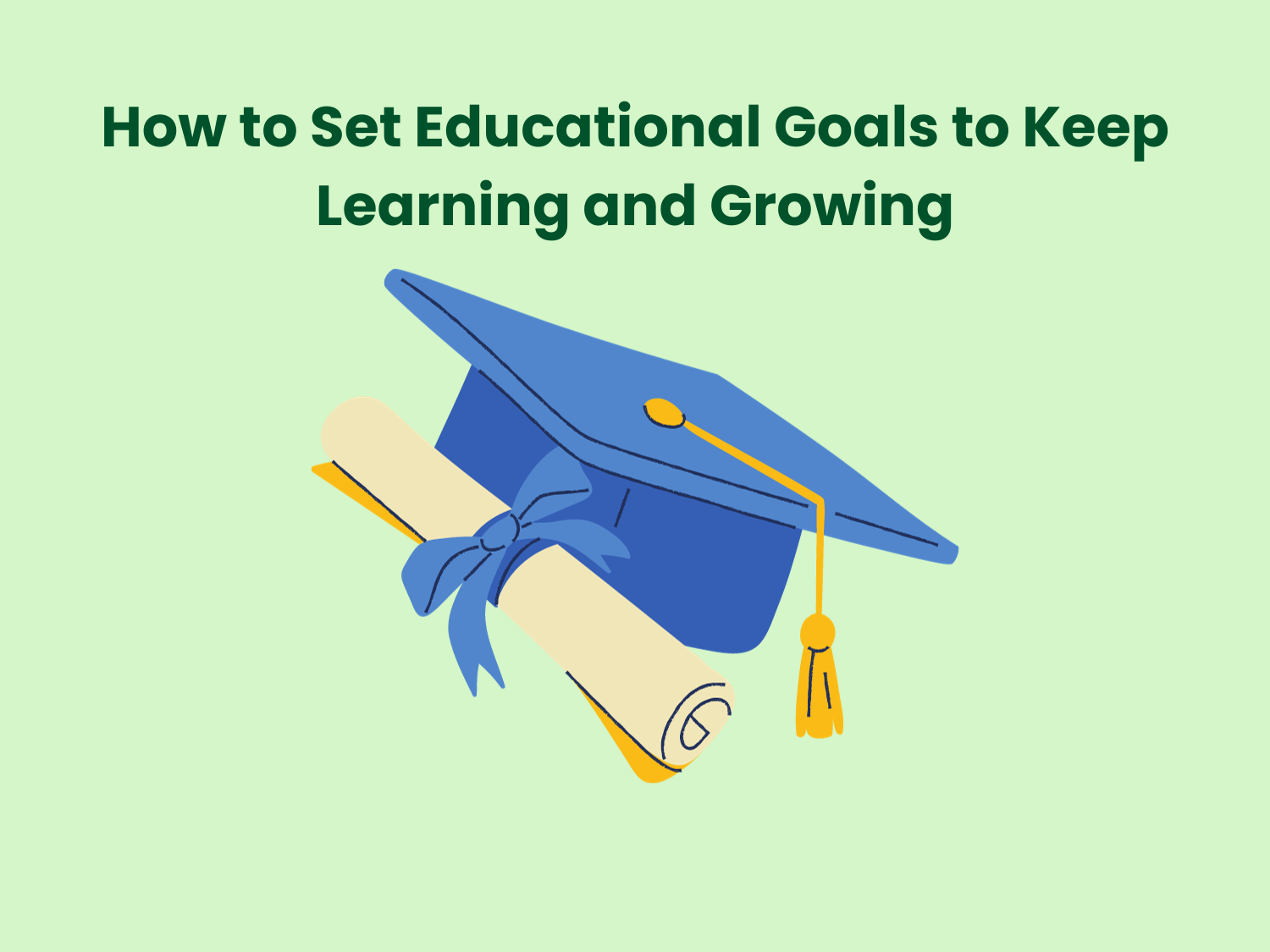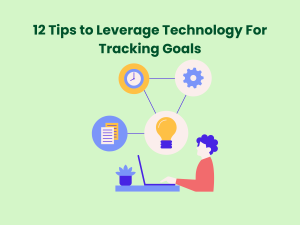Establishing learning and educational goals expands your knowledge, develops skills, and unlocks career opportunities. Lifelong learning fosters an adaptive and empowered mindset. Whether pursuing degrees, self-education or professional certifications, targeted goals help manifest aspirations.
What is a Educational Goal
An educational goal refers to a specific and measurable achievement or outcome that an individual sets for their academic and educational pursuits. These goals are personal objectives that guide one’s learning journey, helping to provide direction, motivation, and a sense of purpose in the pursuit of knowledge and skill development. Educational goals can vary widely depending on a person’s aspirations, academic level, and career ambitions.
Benefits of Educational Goals
Setting and pursuing educational goals can bring about a variety of benefits that contribute to personal and professional development. Here are some key advantages of having educational goals:
- Direction and Purpose:
- Educational goals provide a sense of direction and purpose, helping individuals focus their efforts on specific academic achievements and personal growth.
- Motivation and Engagement:
- Having clear educational goals serves as a motivational factor, encouraging individuals to stay engaged and committed to their studies and learning activities.
- Personal Development:
- Pursuing educational goals fosters personal development by challenging individuals to acquire new knowledge, skills, and perspectives, contributing to overall growth.
- Enhanced Self-Confidence:
- Achieving educational goals boosts self-confidence and a sense of accomplishment, reinforcing the belief in one’s ability to set and attain objectives.
- Time Management Skills:
- Setting educational goals requires effective time management, helping individuals prioritize tasks, allocate time efficiently, and meet deadlines.
- Focus on Continuous Learning:
- Educational goals instill a mindset of continuous learning, encouraging individuals to seek new challenges, explore diverse subjects, and adapt to evolving knowledge.
- Career Advancement:
- Educational goals aligned with career aspirations contribute to career advancement by providing the necessary qualifications, skills, and knowledge for professional growth.
- Increased Employability:
- Attaining educational goals enhances one’s employability by acquiring relevant qualifications and demonstrating a commitment to ongoing learning and skill development.
- Networking Opportunities:
- Pursuing educational goals often involves interactions with peers, professors, and professionals, creating valuable networking opportunities that can support future career endeavors.
- Problem-Solving Skills:
- Engaging in educational goals hones problem-solving skills, critical thinking, and analytical abilities, which are transferable to various aspects of life and work.
- Cultivation of Interests:
- Educational goals allow individuals to explore and cultivate their interests, leading to a deeper understanding of specific subjects and potential career paths.
- Adaptability and Flexibility:
- Achieving educational goals requires adaptability and flexibility in response to changing circumstances, fostering resilience and the ability to navigate challenges.
- Sense of Achievement:
- Accomplishing educational goals provides a tangible sense of achievement, reinforcing the value of effort, persistence, and dedication.
- Improved Communication Skills:
- Many educational goals involve written and verbal communication. Pursuing these goals can lead to enhanced communication skills, which are valuable in personal and professional contexts.
- Life-Long Learning Habits:
- Engaging in educational goals establishes a foundation for life-long learning habits, encouraging individuals to stay curious, curious, and open to new ideas throughout their lives.
- Financial Opportunities:
- Educational goals often lead to increased earning potential and access to financial opportunities, as higher levels of education are correlated with higher income levels.
- Sense of Identity:
- Pursuing educational goals contributes to the development of a sense of identity, as individuals explore their interests, values, and personal strengths through academic pursuits.
- Global Perspective:
- Educational goals that involve exposure to diverse cultures and global perspectives broaden one’s worldview, fostering cultural competence and global awareness.
- Leadership Development:
- Educational goals that involve leadership roles or projects contribute to leadership development, preparing individuals for responsibilities in various personal and professional settings.
- Contributions to Society:
- Achieving educational goals positions individuals to make meaningful contributions to society, whether through research, innovation, social impact, or other forms of service.
Educational goals play a crucial role in personal and professional development, offering a structured path for learning, growth, and success in various facets of life.
Setting Impactful Educational Goals
- Set SMART Goals that are Specific, Measurable, Achievable, Relevant, and Time-Bound:
- Specific: Clearly define what you want to achieve. Instead of a vague goal like “improve writing skills,” specify a particular aspect, like “write one article per week.”
- Measurable: Establish criteria to track progress. This could be the number of hours spent studying, the completion of assignments, or achieving a specific grade.
- Achievable: Ensure your goals are realistic given your current situation, resources, and constraints.
- Relevant: Align your learning goals with your broader aspirations and career objectives.
- Time-Bound: Set a timeframe for achieving your goals, providing a sense of urgency and motivation.
- Map Goals Thoughtfully to Build Qualifications Methodically:
- Plan your learning goals in a strategic manner to build qualifications systematically. Consider the progression of skills and knowledge required for your field or area of study.
- Explore Several Institutions to Find the Best Program Fit:
- Research and explore multiple educational institutions or programs to find the one that best aligns with your learning goals, preferences, and values.
- Envision End Applications of Knowledge Gained:
- Connect your learning goals to their real-world applications. Envision how the knowledge and skills you acquire will be applied in your career or personal pursuits.
- Build a Study Schedule to Accommodate Existing Responsibilities:
- Create a realistic study schedule that accommodates your existing responsibilities, such as work, family commitments, or other obligations. Balance is key to sustainable learning.
- Leverage Community Support Like Study Groups:
- Join or form study groups to leverage community support. Collaborating with peers can enhance your understanding, provide different perspectives, and foster a sense of shared commitment.
- Determine Optimal Pacing for Full Comprehension Over Rushing:
- Prioritize full comprehension over rushing through material. Determine the optimal pacing that allows you to deeply understand concepts and retain information for the long term.
- Seeds Planted Through Education Goals Yield a Lifetime of Fruitful Returns:
- Emphasizes the long-term impact of education and learning. The metaphor of “seeds planted” suggests that the effort invested in educational goals will yield ongoing benefits and rewards throughout one’s lifetime.
By incorporating these best practices, individuals can optimize their learning goals, making the educational journey more strategic, fulfilling, and conducive to long-term success. The emphasis on careful planning, realistic expectations, and a holistic approach to learning contributes to a meaningful and sustainable educational experience.
Types of Education Goals
Goals can target formal degrees, self-directed learning or professional development:
College Degrees
-Earn a bachelor’s degree in computer science in 4 years
-Complete executive MBA program in 30 months while working
Vocational Certificates
-Get project management certification within 1 year
-Pass Cisco networking certification exam this summer
Self-Education
-Read 25 non-fiction books this year for continual learning
-Listen to 3 educational podcasts weekly on career skills
Professional Training
-Complete emotional intelligence workshop this month
-Finish conflict resolution certification in 6 months
-Master Excel dashboarding through Lynda course in 2 months
20 Tips for Achieving Education Goals
Achieving educational goals requires dedication, strategic planning, and effective execution. Here are some tips to help you successfully work towards and achieve your education goals:
- Clarify Your Objectives:
- Clearly define your education goals. Specify what you want to achieve, whether it’s earning a degree, acquiring specific skills, or advancing in your career.
- Set SMART Goals:
- Follow the SMART criteria (Specific, Measurable, Achievable, Relevant, Time-Bound) to structure your goals. This ensures clarity and helps you track your progress effectively.
- Break Goals into Manageable Steps:
- Divide your larger education goals into smaller, manageable steps. This makes the procedure less daunting and allows you to concentrate on one task at a time.
- Create a Detailed Plan:
- Create a comprehensive strategy outlining the steps you must take to reach your objectives. Include deadlines, milestones, and specific tasks to guide your progress.
- Prioritize and Organize:
- Prioritize your tasks based on importance and deadlines. Organize your schedule to allocate time for studying, attending classes, and completing assignments.
- Stay Flexible:
- Be adaptable to changes in your schedule or unexpected challenges. Flexibility allows you to navigate obstacles without losing sight of your ultimate objectives.
- Utilize Available Resources:
- Take advantage of available resources such as libraries, online courses, study groups, and academic support services. Use these resources to improve your learning experience.
- Seek Guidance from Mentors:
- Connect with mentors, teachers, or professionals in your field of study. Seek guidance and advice to gain insights into the industry and learn from their experiences.
- Stay Motivated:
- Find sources of motivation to keep you focused on your education goals. This could include visualizing the benefits of achieving your goals, celebrating small wins, or seeking support from friends and family.
- Develop Good Study Habits:
- Cultivate effective study habits such as creating a dedicated study space, setting specific study times, and using active learning techniques. Consistency is key to building good habits.
- Balance Work and Life:
- Strive for a healthy work-life balance. Avoid burnout by incorporating breaks, self-care, and leisure activities into your routine.
- Network and Collaborate:
- Create a professional network of classmates, instructors, and professionals in your sector. Networking can bring useful information, opportunities, and a support network.
- Stay Updated in Your Field:
- Keep yourself informed about advancements in your field of study. Attend conferences, workshops, or webinars to stay current with industry trends and developments.
- Reflect and Evaluate Regularly:
- Regularly reflect on your progress and evaluate your efforts. Adjust your strategy as needed, and remember to appreciate your accomplishments along the way.
- Embrace Challenges as Learning Opportunities:
- View challenges as opportunities for growth and learning. Overcoming obstacles strengthens your resilience and prepares you for future successes.
- Seek Feedback:
- Request feedback from professors, peers, or mentors. Constructive feedback can provide valuable insights and help you refine your skills and approach.
- Stay Positive:
- Maintain a positive mindset even in the face of setbacks. Positivity can help you overcome challenges and approach your education goals with enthusiasm.
- Celebrate Achievements:
- Celebrate your achievements, both big and small. Acknowledging your progress reinforces a sense of accomplishment and motivates you to continue working towards your goals.
- Explore Internship and Practical Experience:
- Internships, co-op programs, and volunteer activities can help you get practical experience. Practical experience complements theoretical knowledge and enhances your employability.
- Plan for Further Education or Career Steps:
- Consider your learning goals as part of a broader plan. Plan for further education or career steps that align with your aspirations and long-term objectives.
Remember that achieving education goals is a dynamic process that requires dedication, adaptability, and a willingness to learn from every experience. By incorporating these tips into your approach, you can enhance your chances of success in your educational pursuits.
Overcoming Learning Goals Roadblocks
Here are some solutions for common education challenges:
1. Time Constraints – Schedule dedicated study time. Listen to lessons during the commute.
2. Information Overload – Take effective notes. Break material into digestible chunks.
3. Lacking Focus – Study in a quiet, distraction-free environment. Avoid multitasking.
4. Low Motivation – Connect learning to issues you care about. Study with friends.
5. Forgetfulness – Strengthen retention through quizzing and repetition. Apply concepts rapidly.
6. Difficulty – Don’t get intimidated. Go slow, get help from professors and peers.
FAQ
How do I choose what to learn if interests are varied?
Explore broadly then shortlist areas aligned to both passions and pragmatism for opportunities.
Should professional or academic goals take priority?
Aim for synergy – pursue education supporting career advancement based on your stage of life.
What if I achieve a certificate but don’t get opportunities?
Ensure your skills fill high demand roles. Stand out by demonstrating applied skills, not just theoretical knowledge.
How often should I set new educational goals?
After finishing a program, give yourself some time to apply learnings. But continually expand your horizons. Lifelong learning matters.
How can I make time alongside career and family?
Be efficient – blend online and night classes. Wake up early to study. Listen during commutes. But establish balance.
Conclusion
Education unlocks your potential. Let goals guide your curiosity into meaningful personal and professional growth. Keep ascending new heights.



